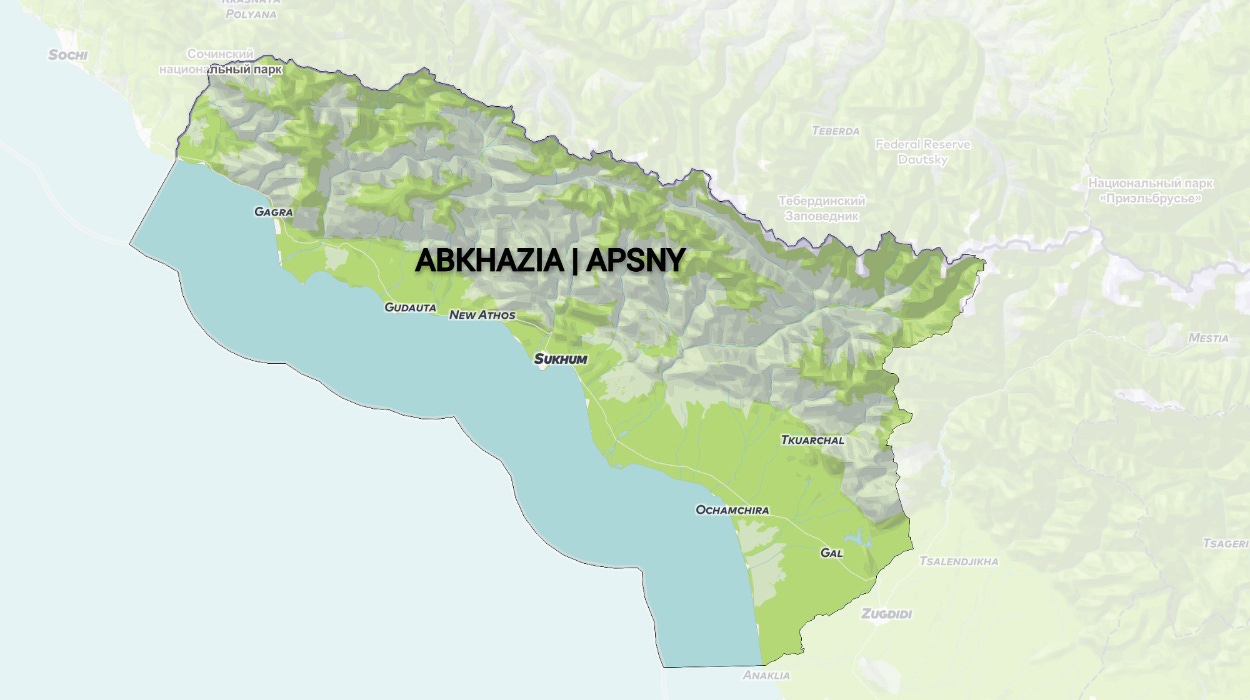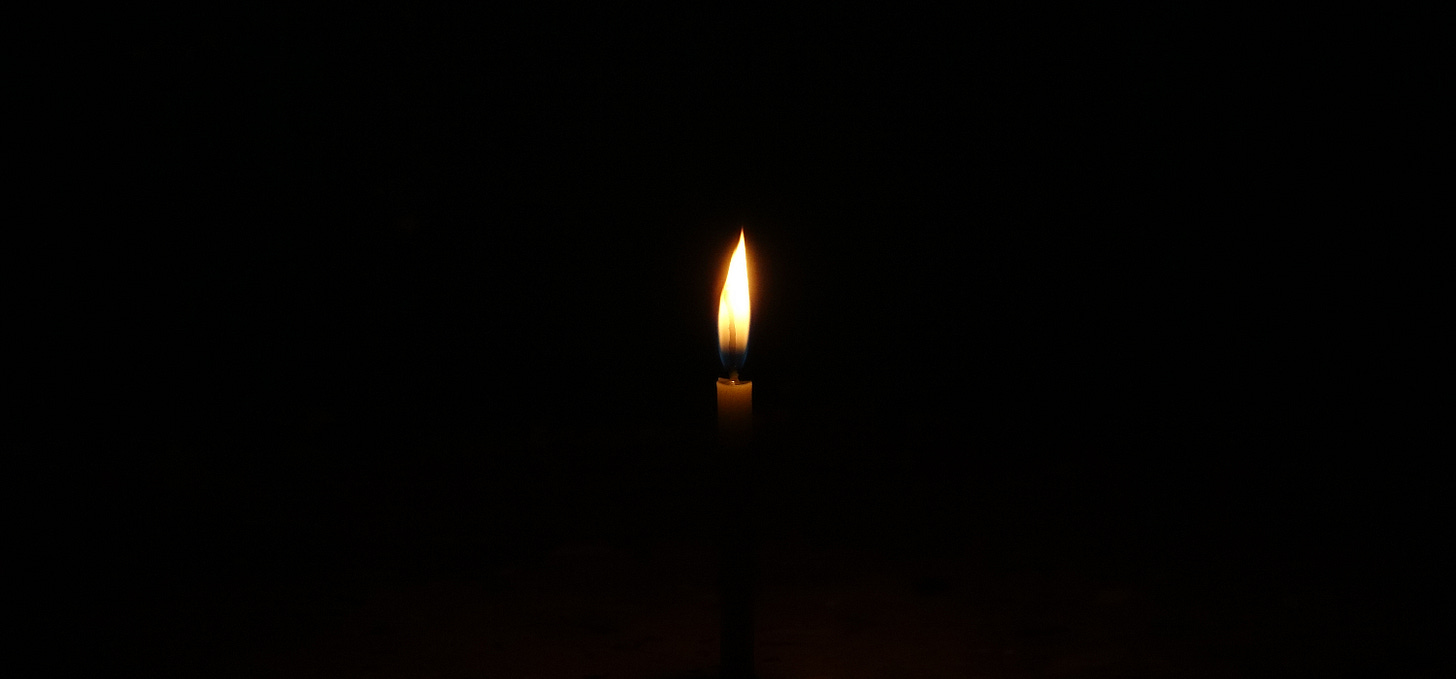Responses to Some Fanciful Ideas of a “Historian” from Paris, Badri Gogia
By Denis Gopia, Аамҭақәа/Times. Historical-Cultural Almanac. Sukhum, No. 1-2. 2024. pp. 335-341.
Аамҭақәа/Times. Historical-Cultural Almanac. Sukhum, No. 1-2. 2024. pp. 335-341.
The article in PDF can be downloaded by clicking here (210 Kb.)
On 13 September 2020, an article titled “Notes on the Appropriation of Megrelian Ethnonyms (ABKHA and PSUA) by Abazin(ian) Colonists and the Appearance of the Apsua People” appeared on Badri Gogia's Facebook page[1]. In this article there is an attempt to revive the anti-scholarly hypothesis of the Georgian literary specialist Pavle Ingorokva, which claims that the Abkhazians (endo-ethnonym Apsua) arrived in the territory of modern Abkhazia in the 17th century from the North Caucasus, whilst the ancient Abkhazians were actually ‘Georgians’. It should be noted that such a hypothesis has been disproved in academic scholarship and is not supported anywhere in the scholarly world; however, there are "specialists" in the history of Abkhazia who attempt to revive this untenable hypothesis. One such controversial "specialist" is Badri Gogia.
Although the academic scholarly community advises that no attention be paid to anti-scholarly articles, they are often published on various websites and contribute to the formation of incorrect positions on various issues of Abkhazian history.
We have prepared some comments to show how such “specialists” mislead their readers. It should be noted that B. Gogia, while naming various late-mediaeval authors such as Pavel Allepskij, Arkangelo Lamberti, Jacob Reineggs, Jean Chardin, P.S. Pallas, and others, does not provide precise references to their works. However, this does not prevent us from referring to the sources mentioned and determining how accurately this author quotes his various sources.
Starting with Jacob Reineggs
Badri Gogia: “Even at the end of the 18th century, it was noted (by Jacob Reineggs) that the Abkhazians did not consider themselves aboriginals.”
Our comments: We are well acquainted with the work of Jacob Reineggs, an 18th-century physician and diplomat who lived in Georgia, entitled “A General Historical and Topographical Description of the Caucasus”. In his book, there is a chapter entitled "The Abkhazians" (Die Abghazsier), which provides important information about the peoples of the Caucasus, including the Abkhazians. He writes: “...Beson, as well as the entire southwestern part of the Kurdish mountains, belong to a mighty, warlike ancient nation which call themselves Abkhazians, and their country - Avasa.”[2]
Jacob Reineggs further reports: “The geographer Strabo called this people Chaldeans, and Pliny described them as Armeno-Chalybes. Circassians and other peoples call them Avasians and Auasians. However, the people living on the Kuban River, known as the Abadzekhs, consider themselves a colony that long ago separated from the Abkhazians, calling their country Great Avasa, and their own - Lesser Avasa. The opinions of the Abkhazians themselves about their roots vary. Some believe that they did indeed originate from the Armenians; others, conversely, claim that their ancestors came from Egypt. Regardless, in both Great and Lesser Avasa, the inhabitants speak the same language, albeit with different pronunciations, and they share similar customs. This language is completely unlike Armenian, resembling more closely a dialect of Circassian.”[3]
Considering that in those centuries there was not yet a scholarly school dedicated to the study of the history of the Abkhazian people, such confused, and sometimes incorrect, data about the origin of the Abkhazians are understandable. Jacob Reineggs wrote nothing more about the origin of the Abkhazians, including their alleged arrival in Abkhazia. Moreover, he refers to this people as a "mighty ancient nation", and traces the Abadzekhs, one of the Circassian sub-ethnoses, from the territory of Abkhazia.
Toponymy of the Sukhum-Akua Region According to Medieval Narrative and Cartographic Sources, by Denis Gopia
Топонимика региона Сухум-Акуа по средневековым нарративным и картографическим источникам
(Toponymy of the Sukhum-Akua Region According to Medieval Narrative and Cartographic Sources)
Author: Denis K. Gopia
Year: 2024
Place of Publication: Sukhum / Aqw'a, Abkhazia
Published by: Abkhazian Historical Society [Aamҭaқәa Journal, No. 1-2.]
Number of pages: 37 (pp.53-73 / and 12 maps)
Language: Russian
PREFACE (Translated from Russian)
Sukhum, the capital of the Republic of Abkhazia, has a profound history dating back about 2,700 years, according to the latest data. The city essentially embodies the history of the country. Therefore, the accurate identification and localisation of all its various names, and, of course, the time and conditions of its founding are of significant importance in modern life. Many renowned researchers have addressed these issues for over a century and a half (F. Dubois de Montpére, D.I. Gulia, L.N. Solovyev, M.M. Trapsh, Y.N. Voronov, G.K. Shamba, G.A. Lordkipanidze, among others). In this work, these fascinating inquiries are continued by the young historian Denis Gopia, with the aid of medieval European maps from the 14th to the 18th centuries he discovered. He is a graduate student at the Abkhazian Institute for Geographical Research named after D.I. Gulia of the Abkhazian Academy of Sciences.
Researchers have more or less figured out the names and locations of the city in ancient and early medieval times, although even here, the latest excavations by A.B. Belinsky and I.I. Tsvinaria in the village of Adzyubzha have sparked debate. The situation with the medieval names of the city is more complicated: Tskhum – Sukhum and “porto megrelo” – “Kelasur”. The author rightly, in my opinion, demonstrated that all the medieval toponyms (rivers, hills, settlements) located within and around the current city of Sukhum, have an underlying ancient Abkhazian character (“couleur locale”) with secondary Kartvelian, Italian, and Turkish layers. In short, the toponym Akuа is associated with Bagrat’s castle, Tskhum – with the Basla-Kelasur interfluve, “porto megrelo” – with the mouth of the Kelasur river.
The full article in PDF can be downloaded by clicking here (29.7 MB)
The 'Abkhazia | Caucasus Maps' album, a curated collection of maps that traverse the sands of time in the Caucasus region.
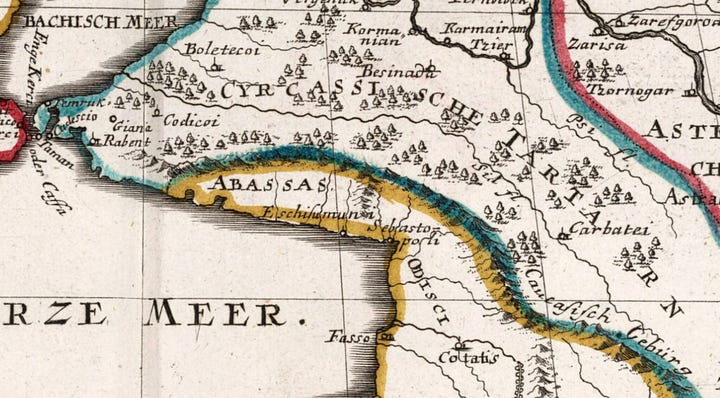

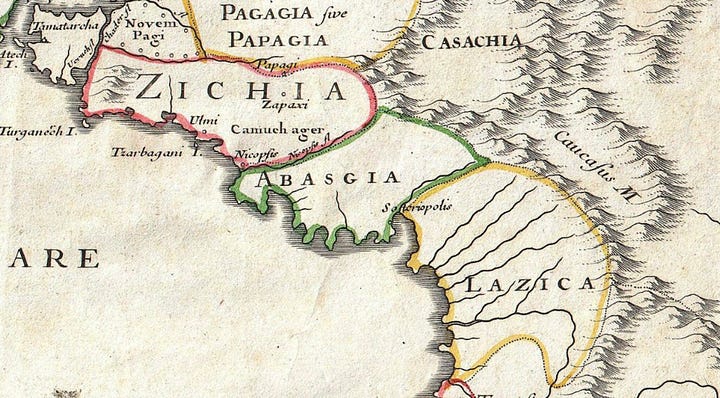
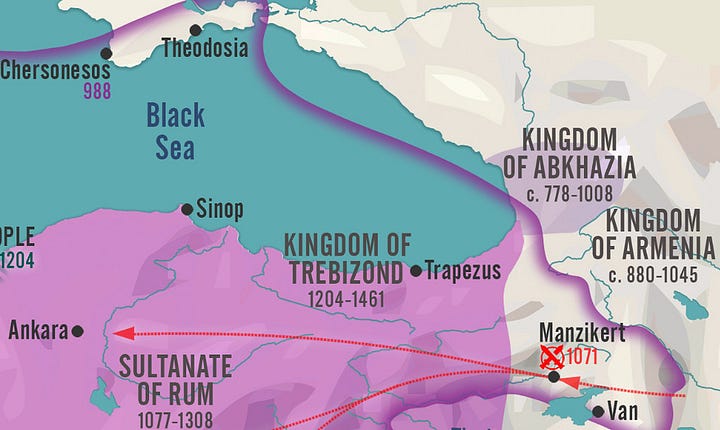
The Abkhazian-Russian Cold War, by Tengiz Ablotia
Nation.ge ― Something unimaginable is happening in Abkhazia. Incredible, and at first glance, impossible.
Generally, in Georgia, the perceptions about Abkhazia are mostly superficial and incorrect. This is partly related to propaganda, which reinforces the idea that there is no Georgian-Abkhazian conflict and that everything in Abkhazia is decided by Russia.
"Och, who are the Apswas? – whatever Russia tells them, they’ll do it, ro they have no will of their own, and essentially, there is no Abkhazian nation; the Abkhazians are Georgians, whereas these are the Apswas" - This is the view that predominates among so-called "ordinary folk", whilst in the relatively modern and Europeanised segment, the thesis of Georgian propaganda about "our Abkhazian and Ossetian brothers" is echoed word for word.
All three narratives are completely detached from reality, but the aforementioned surprise is linked to one among them - Abkhazia's dependence on Russia.
Only someone who knows nothing about the Abkhazians could imagine that they are slaves to the Russians, doing everything the Kremlin commands. What is happening in Abkhazia today is completely contrary to this stereotype.
Using its financial, military, and political influence, Moscow is imposing a legislative package on the Abkhazians, which effectively turns Abkhazia into a part of Russia - first legally, then in practice. These laws are about the harmonisation of legal bases, mutual recognition of judicial decisions, the rights of Rosgvardia to operate in Abkhazia, apartments, and foreign agents.
None of these laws has been adopted to date; this package was initiated by Moscow almost 2 years ago and the receiver would have received quite some time ago. However, none is close to being adopted; currently, the parliament is considering a draft law about foreign agents, but the discussion is clearly being dragged out, and when it will become an official document is unknown.
Inar Gitsba Announces Early Resignation from Abkhazian Parliament
In a statement published on his Telegram channel, Inar Gitsba, a member of the Parliament of Abkhazia, announced his early resignation from his duties. "Today, 15 March 2024, I have decided to prematurely end my tenure as a deputy of the People's Assembly – Parliament of the Republic of Abkhazia. As I turn the page to a new chapter in my life, I will continue to serve the interests of the people of the Republic of Abkhazia," he wrote.
On 25 December 2023, Inar Gitsba voted against the ratification of the Russian-Abkhazian agreement on transferring the Pitsunda state dacha to Russia. The decision was supported by 26 deputies, two voted against, and three left the session in protest (out of a total of 35 parliamentarians).
Elections for the VII convocation of the People's Assembly were held in March 2022, with Gitsba running as a candidate from District No. 1 (New District, Sukhum). Before his election to the Parliament, Inar Gitsba served as the plenipotentiary representative of the Republic of Abkhazia in the Republic of Türkiye.
Messages of Sympathy: Abkhazia Responds to Crocus City Hall Terror Attack
In response to the tragic terrorist attack at Crocus City Hall in Krasnogorsk, near Moscow, organisations and leaders from Abkhazia have stepped forward to offer profound condolences and solidarity. The attack on the evening of 22 March 2024, involving four gunmen and resulting in the loss of 137 lives with over 145 injured, stands as the deadliest terrorist incident in Russia since the Beslan school siege in 2004, and the most tragic in Moscow's history.



